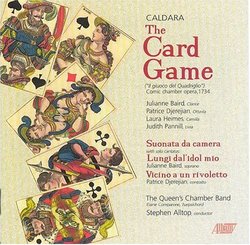| All Artists: Antonio Caldara, Stephen Alltop, Queen's Chamber Band, Elaine Comparone, Julianne Baird, Judith Pannill, Patrice Djerejian, Laura Heimes Title: Caldara: The Card Game Members Wishing: 0 Total Copies: 0 Label: Albany Records Release Date: 9/28/2004 Genres: Pop, Classical Styles: Vocal Pop, Opera & Classical Vocal, Chamber Music, Historical Periods, Baroque (c.1600-1750) Number of Discs: 1 SwapaCD Credits: 1 UPC: 034061070528 |
Search - Antonio Caldara, Stephen Alltop, Queen's Chamber Band :: Caldara: The Card Game
 | Antonio Caldara, Stephen Alltop, Queen's Chamber Band Caldara: The Card Game Genres: Pop, Classical
Antonio Caldera composed during the most flourishing period of the Baroque. While his contemporaries - Handel, Bach, Scarlatti and Vivaldi - are today held in higher esteem, in his own day, Caldera's vocal output was much ... more » |
Larger Image |
CD Details
Synopsis
Album Description
Antonio Caldera composed during the most flourishing period of the Baroque. While his contemporaries - Handel, Bach, Scarlatti and Vivaldi - are today held in higher esteem, in his own day, Caldera's vocal output was much celebrated. 18th century music critic Charles Burney called him "one of the greatest professors both for the Church and the stage that Italy can boast," and rated Caldera second only to Handel for his vocal writing. He was born in Venice to musical parents. He was a working musician from an early age as both contralto chorister and cellist at St. Mark's in Venice, at the same time composing vocal music. He continued to draw a salary (with pay raises) until nearly the age of 30 as a contralto at the basilica. It was the custom of the 18th century for wealthy patrons to subsidize composers. The pragmatic Caldera always played his cards wisely and always had work. For the final twenty years of his life, Caldera maintained a comfortable position at! the Viennese court where he produced an immense operatic and oratorio output. The court feats included operatic productions commemorating the birthdays and name days of the royal family. The Emperor himself studied keyboard and conducting with Caldera, and his two daughters sang on these occasions as well. In the summer of 1734, Caldera celebrated the Empress' birthday with a charming operatic gem Il giuoco del Quadriglio (The Card Game), for which the composer provided roles for the young archduchess and for his own wife Caterina. This work offers each of the four female vocalists her own da capo solo turn. It is scored for strings and continuo with the delightful and unexpected appearance of flute and lute and then a final happy ending quartet for everyone.

 Track Listings (1) - Disc #1
Track Listings (1) - Disc #1